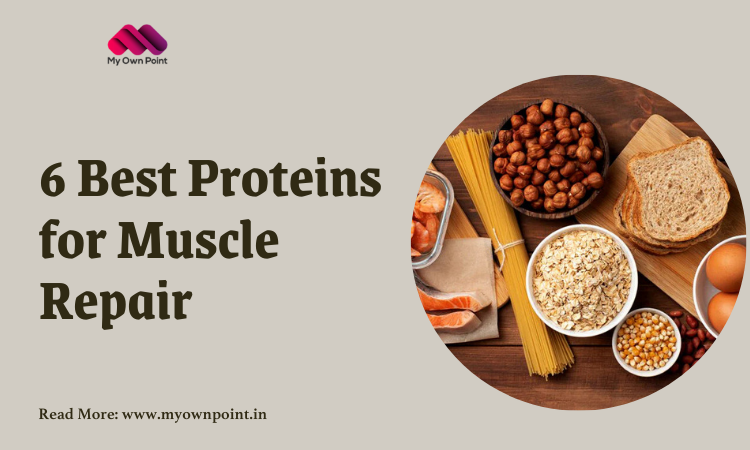Unprepared attempts at sports, exercise, or an injury can set back and ultimately dictate when an athlete may return to sports after an injury. Recovery and repair of muscle are among the most critical components of athletic performance. Protein is an essential and major component of muscle tissue. In the following sections of this article, the focus will be on the types of best proteins for muscle repair. In this blog, we will discuss the 6 best proteins for muscle repair, their benefits, sources, and how they can help you achieve your fitness goals. From lean meat to plant-based options, there are varying options for everyone trying to recover and grow muscle.
Also Read: Lose Weight in 15 Days With Jeera Water
The Role of Protein in Muscle Repair
Exercise-induced muscle damage means high-intensity activities or resistance exercises where the muscle fibers undergo microtears. As a result of this, the body starts a repair process whereby the muscle fibers are rebuilt stronger than before. Recovery from muscle damage involves numerous processes that use protein as a fuel source for the rebuilding of muscle tissues. Having balanced proportions of all nine essential amino acids can significantly aid in recovery. One crucial component for muscle protein synthesis is leucine, which is an anchor to the essential amino acids.
6 Best Proteins for Muscle Repair for Beginners
The primary factors that inadequate protein intake brings to the body are associated with poor tissue repair. Coupled with longer recovery times, it begins to diminish overall performance and increases the likelihood of injury. Let us now get into the best high-protein foods for muscle repair:
1. Whey Protein
Whey protein is the best protein powder for muscle gain and recovery. It is extracted from milk during the manufacture of cheese. What’s more, it contains all nine essential amino acids, which provides an opportunity to classify it as a complete protein.
Benefits
- High in leucine: Leucine is essential in triggering muscle protein synthesis, and whey has high levels of it.
- Easily Digestible: Whey breaks down fairly quickly, so it’s best suited to be consumed post-workout when the body is in a nutrient-hungry state.
- Speedy Recovery: Studies have shown muscle soreness and recovery are optimized by consuming whey immediately following exercise.
How do we consume it?
- Shakes right after a workout
- Later in the day, during a lunch with oatmeal or smoothies
Best Whey protein for muscle repair and muscle gain
- Dymatize Whey Rich Chocolate
- PentaSure Neutron 100% Whey Protein Powder
- GNC Whey Protein
- MuscleBlaze Biozyme Performance Whey Protein
Also Read: Vitamin Deficiencies That Cause White Hair
2. Casein Protein
Like whey, casein is a milk-derived protein that is digested slower than whey protein. This results in a steady release of amino acids over several hours.
Advantages for Muscle Recovery.
- Sustained Release of Amino Acids: The slow absorption rate of casein makes it useful for muscle repair while sleeping or if food is not available for a long period.
- Prevents Muscle Mass Loss: Its anti-catabolic nature preserves muscle tissue during low-activity periods and during resting days.
How to Consume It
- As a pre-bedtime protein shake
- On its own in the form of protein-rich baked snacks
3. Egg Protein
Egg protein, commonly marketed as egg white protein powder, provides an alternative that is void of lactose yet still high in amino acids.
Benefits
- High Biological Value (BV): The value of protein is ascertained by how effectively the body can use it. Protein from eggs ranks among the topmost, depicting its efficacy in muscle recovery.
- Allergy Friendly: Egg protein is one of the best forms of protein for people who may have issues with dairy.
- Nourishing: Eggs are a good source of many vitamins and minerals, especially vitamin D and choline which are important for optimal wellbeing.
Recommended Consumption
- Hard boiled eggs or salads
- Shakes with added egg white protein powders
4. Plant-Based Proteins
For vegans and others who distance themselves from animal sourced food such as meat, soy, pea, and rice proteins make useful substitutes.
Benefits
- Complete Options Available: Pea and rice protein can be combined to achieve a full amino profile and soy is a complete protein which enhances muscle growth.
- Digestibility: Modern advancements in technology have increased the efficiency and effectiveness of extracting plant based proteins.
- Additional Nutritional Benefits: Several plant-based diet have additional benefits such as phytonutrients and fiber.
How to Use It
- Blended plant based protein powders, Fortified plant milks, and food.
Also Read: What is Balanced Diet? Definition, Benefits, and Examples
5. Collagen Protein
Collagen protein is becoming increasingly popular due to its role in ligaments, tendons, and cartilage in the body. It helps in the repair of connective tissues, instead of superficial muscle building.
What are its advantages?
- For muscles – recovering from injury and overall related muscle damage.
- For connective tissues – collagen deficient diets can lead to joint and tendon injuries, during which these try to recover.
- In combination with the other proteins – Plant and whey protein lacked proper recovery support due to being incomplete proteins, but when combined with collagen they did wonders.
- For faster injury recovery, glycine and proline help greatly due to their involvement in collagen development.
Methods of consumption
- Add collagen to coffee or tea
- Add collagen to broth or soup
6. Whole Food Protein Sources
You can take the best natural supplement for muscle recovery since they are more nutrient dense.
Best Whole Food Options
- Lean Meats: Chicken, turkey, or lean cuts of beef not only provide protein but also nutrients like iron and zinc.
- Fish: Salmon and mackerel are fatty fish high in omega-3 that helps with inflammation and are helpful for recovery.
- Legumes: Plant based protein can be found in lentils, chickpeas, and beans, which support muscle repair as well as digestive health.
Meal Ideas
- Quinoa with grilled chicken and steamed vegetables
- Spinach with sweet potatoes and salmon
- Lentil stew with mixed vegetables
Also Read: Budgeting for Adventures: 8 Creative Ways to Save Money for Travel
Timing and Dosage
You need to eat protein everyday to maintain muscle. Studies recommend dividing your consumption into 3–5 meals for the best result.
- Post-Workout: Try consuming 20-40 grams of good protein within 30 minutes – 2 hours after workout.
- Before growing Sleep: Casein or any other protein source which is slow to digest can help in recovery overnight.
- Daily Recommended: 1.2 – 2.0g of protein are required for every kilogram of body weight for active people.
Conclusion
Selecting the right protein for muscle repair will always be determined by a person’s preference, diet and activity level. Plant-based protein is an adequate source for collagen good for muscle building. For maximum muscle gain and minimum fat percentage, whey and casein is highly recommended as the best source of protein. For greater results with faster muscle repair, it is recommended that a combination of these various plant and animal based sources should be used.




